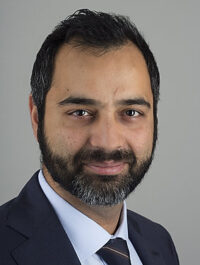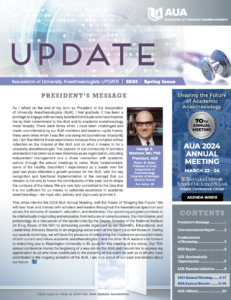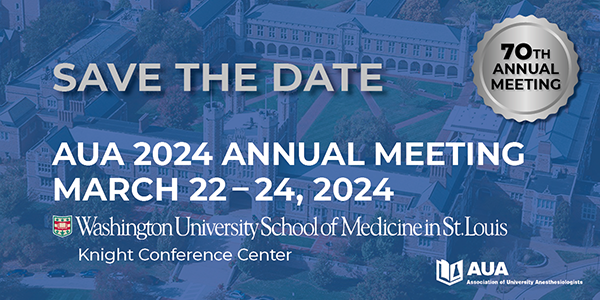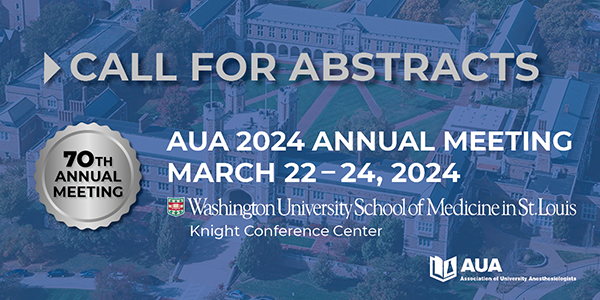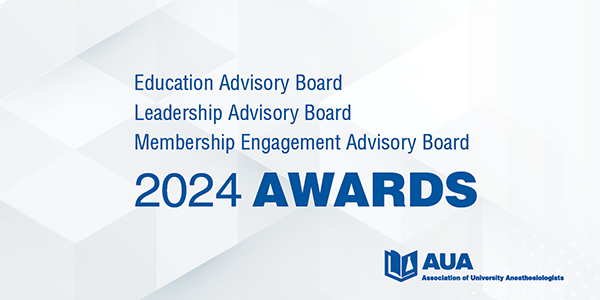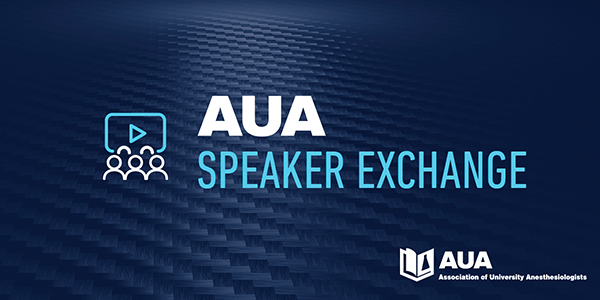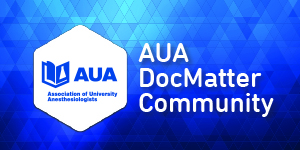Communications & Website Committee Report
It is my great pleasure to present a report on the Communications and Website Committee's work over the last few months. The AUA's mission, as we all know, is to promote excellence in academic anesthesiology, and this committee has been working tirelessly towards this goal.
As the AUA transitions to a more nimble organization, it is essential to ensure that our communication strategies align with our objectives.
The Communications and Website Committee has been at the forefront of promoting the AUA's vision of advancing academic anesthesiology through mentorship, professional growth, and the promotion of diversity and inclusivity. The committee has worked hard to improve the AUA's website, making it more accessible and user-friendly. This has included updating the site's content to reflect the current state of academic anesthesiology and making it easier for members to access critical information. In addition to enhancing the AUA's online presence, the Communications and Website Committee has been working on developing a comprehensive communications strategy. This includes identifying key stakeholders and developing targeted messaging to ensure that the AUA's mission is well understood by all. The committee has also been working to enhance the AUA's presence on Twitter, where we now have over 1,500 followers. Through this work, the committee has been able to reach a broader audience and provide updates on the AUA's activities, as well as relevant news and research in academic anesthesiology. By leveraging social media platforms, the AUA can better connect with members and non-members alike and engage them in meaningful conversations about academic anesthesiology.
The Communications Committee at the Association of University Anesthesiologists welcomes new members Drs. Jaime Aaronson, Karthik Raghunathan, and Jingping Wang. The committee is dedicated to fostering communication among members, promoting messaging from the AUA Council and the Boards, and disseminating relevant information. The committee membership includes a diverse group of professionals from various institutions, such as Dr. David Mintz from John Hopkins University School of Medicine, Dr. Susan M. Martinelli from The University of North Carolina School of Medicine, and Dr. Maya Hastie from Columbia University. Other experienced members include Dr. Ronald George from UCSF, Dr. Sesh Mudumbai from VA Palo Alto HCS/Stanford University School of Medicine, and Dr. Sara Neves from Beth Israel Deaconess Medical Center. Together, these experts contribute their unique perspectives and experiences to advance the goals of the committee and the AUA.
We are very much looking forward to the upcoming AUA Annual Meeting! The conference will begin with a welcome address by the AUA Council President Dr. George Mashour on Thursday, April 13, 2023. Attendees will participate in a series of engaging sessions. The day also features a lunch session that includes the presentation of EAB and LAB awards, as well as the host program led by the University of Colorado School of Medicine. The Leadership Advisory Board Panel will tackle the pressing issue of discrimination and privilege in academic medicine, while the day will conclude with a Junior Faculty Networking Opportunity and the President's Reception at the Denver Art Museum. The conference will continue on Friday, April 14, with a Women in Academic Anesthesiology Networking Session. The day features a series of educational and leadership panels, covering topics such as reflective practice, physician leadership in healthcare systems, and mentorship. The conference will conclude with the President's Panel on the intersection of quantum physics and biology.
Our high quality webinar series has been supported by the Communications Committee. Recent webinars included topics such as growing and retaining a sustainable pain research workforce, increasing the value of anesthesiology through public health, and navigating the new world of pregnancy care. Additionally, the series features webinars on using cognitive load theory for better presentations, self-assessment improvement strategies, and academic time and productivity. These free webinars require pre-registration, with CME credits exclusively available for AUA members. Recorded presentations are also accessible to members after the webinars.
The SAB has done great work in initiating the AUA Speaker Exchange to facilitate interpersonal networking, scientific collaboration, and academic advancement in anesthesiology. This platform aims to match accessible speaking engagements with qualified speakers, focusing on junior faculty and smaller host venues such as divisional conferences and research seminars. The program emphasizes diversity and inclusion, and is open to individuals engaged in anesthesiology, critical care, and pain medicine-related fields.
Mentorship, sponsorship, and coaching in medicine have been proven to positively impact career trajectories, leading to increased visibility, scholarship, publications, promotions, improved retention, and overall career satisfaction. The committee has supported the set-up of a Mentoring Program over the last few months spearheaded by the EAB. A series of inspiring videos have been produced by leaders in the field to support the mentoring program and tell their individual stories. Dr. Wiener-Kronish shares her inspiring journey in academic medicine, recounting how she was initially discouraged by being told, "women don't belong in academic medicine." However, Dr. Ronald Miller believed in her potential and assured her that he would help her succeed in academic medicine if she trained in anesthesia. In another mentoring story, Dr. Xie talks about his pursuit of research in Dr. Rudy Tanzi's lab. Despite initial hesitation, Dr. Tanzi was ultimately impressed by Dr. Xie's determination and unique ideas. Dr. Njoku explores how geographic mentor-mentee interactions have evolved over time, adapting to new forms of communication and collaboration. Dr. Mashour emphasizes the importance of becoming an AUA mentor, highlighting the positive impact it can have on the career trajectory of junior faculty. These stories showcase the value of mentorship in shaping and guiding the careers of academic anesthesiologists, ultimately promoting growth and success in the field.
We strongly encourage and support all our members, including active and associate, newcomers and veterans, to actively engage with us at our meetings and through our primary communication platforms: the AUA Update, and Twitter (@AUA_Anesthesia). These channels provide timely, relevant information on various aspects of the Association, such as AUA webinars, membership opportunities, mentorship programs, and speaker exchanges, among others. We highly value the contributions of our members and welcome your submissions to these platforms. By fostering a collaborative and interactive environment, we aim to promote the exchange of ideas, knowledge, and experiences, ultimately enriching the field of academic anesthesiology.
